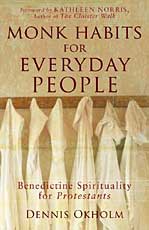Dennis Okholm is a professor of theology and philosophy at Azuza Pacific University and parish associate at St. Andrews Presbyterian Church in Newport Beach, California. Having derived spiritual edification and inspiration from Benedictine spirituality, the author wants to share its riches with his evangelical brethren who are Protestant through and through. He identifies a roadblock in the way:
"Protestants do not usually go for the habitual when it comes to spirituality. For some reason we grow up with the bias that spiritual practice is 'real' only if it is spontaneous. Habits (whether garments worn or behaviors cultivated) and read prayers often strike us as fake spirituality."
Okholm begins with a serious look at the Rule of Benedict which stands as the most influential document in the history of Western monasticism. He then discusses why Protestants can benefit from an encounter with this tradition which is aimed at the movement toward spiritual maturity. The first thing the Rule of Benedict emphasizes is the importance of listening. And that requires a degree of silence and a sensitivity to what is going on around us. Or as Emily Dickinson put it: "Take care for God is here." Many Protestants are uncomfortable with silence. See the excerpt for an example of this by Anthony Bloom, an Orthodox theologian and writer.
Benedictine was convinced that regular spiritual practice could transform monks and change their ways of acting. Okholm explores these virtues: obedience (objectifying Providence), humility (letting go of the mask), hospitality (the guest as Christ), stability (staying put to get somewhere), and balance (God in everything). The author ends with some suggestions for practicing Benedictine spirituality, including:
• Include a time of silence in your day.
• Remember that every moment of our lives is lived in Divine Presence.
• Care for those you live with, work with, and worship with.
• Refrain from judging others and pray for them instead.
• Treat all physical objects in your environment with care and reverence.
